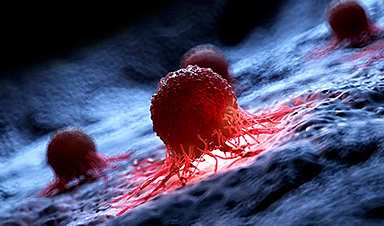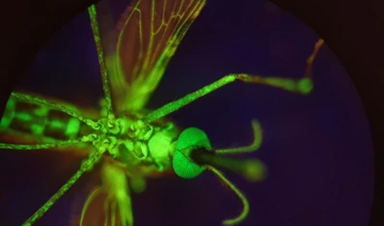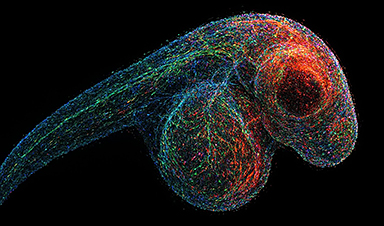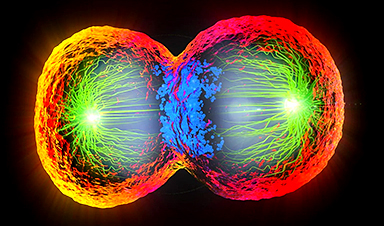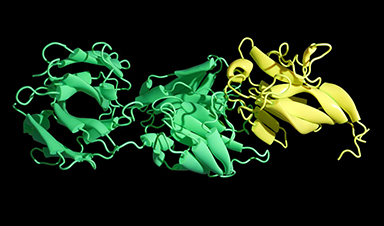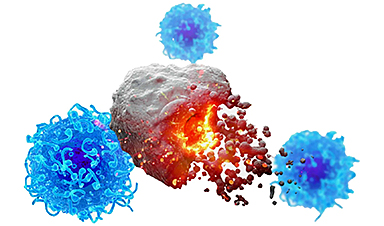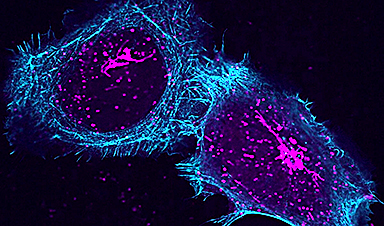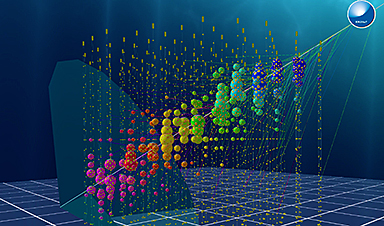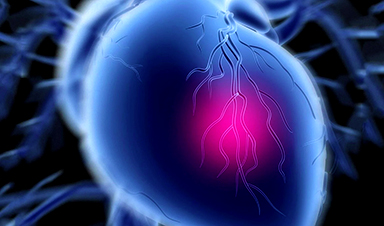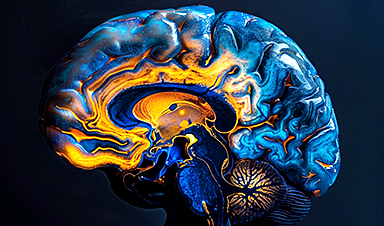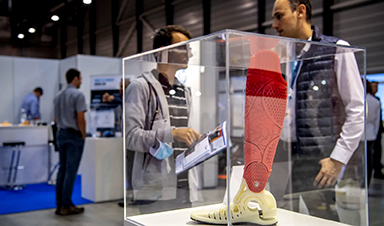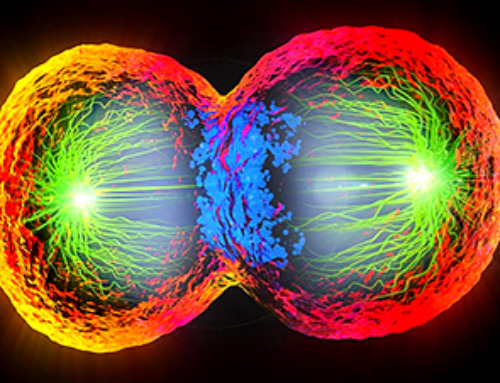Nanotechnology represents the future of personalised medicine, especially in treating diseases like cancer, says a top Swiss researcher in the field. What can the technology do, and how close does it come to science fiction scenarios?
For some, the term “nano” conjures strange scenarios out of science fiction. But nanoscience simply refers to a technique for manipulating particles on a “nano” scale, such as molecular. Rather than scaring us, the technology should give us hope, argues Cornelia PalivanExternal link, Professor of Physical Chemistry at the University of Basel and a member of the Swiss Institute of Nanotechnology.
SWI swissinfo.ch: Do you think the scenario presented in this science fiction story is likely, and that nanotechnology injected into the human body could somehow take over and manipulate a person?
Cornelia Palivan: I would say not. We are very, very far from that scenario. So-called “nanobots” are science fiction for the moment – something fascinating, but remaining surreal. One might reflect, at most, on the danger of engineering nanoparticles containing toxic compounds, or of potentially lethal chemical and biological weapons being developed by governments, but we are talking about poisons here and that has nothing to do with size. The label “nano” does not define a technology as good or bad, but instead identifies a way of solving problems at a molecular level. This can be extremely useful, especially in medicine.
SWI: How so? What does it mean to develop nanotechnology today?
C.P.: My research group and I are working on the implementation of nanotechnology in various fields, from medicine to ecology and food science. We are doing this through the development of so-called “bio-hybrid materials”, obtained by combining biomolecules – such as proteins and enzymes – with synthetic materials in very small quantities. We are talking about nano-scale compartments (very small capsules) that do not exceed 100 nanometres in radius and within which we encapsulate, for example, enzymes that will act when these compartments are absorbed by the body.
One of the problems in medicine is that the biomolecules contained in drugs quickly lose their effectiveness. With bio-hybrid materials as our nanocompartments, it is possible to maintain the full functionality of proteins and enzymes and ensure that they carry out their activities. Moreover, thanks to these synthetic “nano capsules”, the biomolecules are protected and remain intact.
SWI: Is nano-medicine more effective than traditional drugs?
C.P.: Yes, but it’s not just a question of efficacy. In medicine, the biggest challenge today is to also make drugs safer, by reducing side effects. Anyone can go to the pharmacy and buy different coloured pills to treat different diseases. But the question is: what’s in them? The idea is that the doctor of the future will not only prescribe medicine to his or her patients but will also make sure that the medicine works in the right place and is not toxic to other parts of the body. This is what everyone expects when they go to the pharmacy. From this point of view, nanotechnology can help, because it allows these carriers to be “engineered”.
Working with nanotechnology means trying to copy nature to understand how a specific protein acts inside a cell and replace it where necessary if it is missing due to a disease. If we resort to the classic solution – the introduction of molecules in powder form, as is the case with most drugs – the risk is that in some situations the substances will not make it into the cells because they are too big to be absorbed.
A well-known example is vaccines based on messenger RNA technology [such as those developed against Covid-19]. Ribonucleic acid or RNA is embedded in nanoparticles that act as carriers named “vectors”. These vectors protect the molecule and transport it to where it is needed. Being chemically engineered, these nanoparticles are more likely to be accepted by cells.
SWI: Are there risks associated with nanotechnology, also given that it’s new?
C.P.: Of course. But it’s difficult to say what the risks are because it takes several years of tests and clinical results before we can assess them in their entirety. So it’s normal for people to ask questions. For example, in the case of the Covid-19 vaccines, we know that they work well and we know the short-term effects, but we don’t yet know the long-term effects because nobody has had time to study in-depth something that appeared a year and a half ago. So these long-term risks have to be addressed by science.
News
Cancer’s “Master Switch” Blocked for Good in Landmark Study
Researchers discovered peptides that permanently block a key cancer protein once thought untreatable, using a new screening method to test their effectiveness inside cells. For the first time, scientists have identified promising drug candidates [...]
AI self-cloning claims: A new frontier or a looming threat?
Chinese scientists claim that some AI models can replicate themselves and protect against shutdown. Has artificial intelligence crossed the so-called red line? Chinese researchers have published two reports on arXiv claiming that some artificial [...]
New Drug Turns Human Blood Into Mosquito-Killing Weapon
Nitisinone, a drug for rare diseases, kills mosquitoes when present in human blood and may become a new tool to fight malaria, offering longer-lasting, environmentally safer effects than ivermectin. Controlling mosquito populations is a [...]
DNA Microscopy Creates 3D Maps of Life From the Inside Out
What if you could take a picture of every gene inside a living organism—not with light, but with DNA itself? Scientists at the University of Chicago have pioneered a revolutionary imaging technique called volumetric DNA microscopy. It builds [...]
Scientists Just Captured the Stunning Process That Shapes Chromosomes
Scientists at EMBL have captured how human chromosomes fold into their signature rod shape during cell division, using a groundbreaking method called LoopTrace. By observing overlapping DNA loops forming in high resolution, they revealed that large [...]
Bird Flu Virus Is Mutating Fast – Scientists Say Our Vaccines May Not Be Enough
H5N1 influenza is evolving rapidly, weakening the effectiveness of existing antibodies and increasing its potential threat to humans. Scientists at UNC Charlotte and MIT used high-performance computational modeling to analyze thousands of viral protein-antibody interactions, revealing [...]
Revolutionary Cancer Vaccine Targets All Solid Tumors
The method triggers immune responses that inhibit melanoma, triple-negative breast cancer, lung carcinoma, and ovarian cancer. Cancer treatment vaccines have been in development since 2010, when the first was approved for prostate cancer, followed [...]
Scientists Uncover Hidden Protein Driving Autoimmune Attacks
Scientists have uncovered a critical piece of the puzzle in autoimmune diseases: a protein that helps release immune response molecules. By studying an ultra-rare condition, researchers identified ArfGAP2 as a key player in immune [...]
Mediterranean neutrino observatory sets new limits on quantum gravity
Quantum gravity is the missing link between general relativity and quantum mechanics, the yet-to-be-discovered key to a unified theory capable of explaining both the infinitely large and the infinitely small. The solution to this [...]
Challenging Previous Beliefs: Japanese Scientists Discover Hidden Protector of Heart
A Japanese research team found that the oxidized form of glutathione (GSSG) may protect heart tissue by modifying a key protein, potentially offering a novel therapeutic approach for ischemic heart failure. A new study [...]
Millions May Have Long COVID – So Why Can’t They Get Diagnosed?
Millions of people in England may be living with Long Covid without even realizing it. A large-scale analysis found that nearly 10% suspect they might have the condition but remain uncertain, often due to [...]
Researchers Reveal What Happens to Your Brain When You Don’t Get Enough Sleep
What if poor sleep was doing more than just making you tired? Researchers have discovered that disrupted sleep in older adults interferes with the brain’s ability to clean out waste, leading to memory problems [...]
How to prevent chronic inflammation from zombie-like cells that accumulate with age
In humans and other multicellular organisms, cells multiply. This defining feature allows embryos to grow into adulthood, and enables the healing of the many bumps, bruises and scrapes along the way. Certain factors can [...]
Breakthrough for long Covid patients who lost sense of smell
A breakthrough nasal surgery has restored the sense of smell for a dozen long Covid patients. Experts at University College London Hospitals NHS Foundation Trust successfully employed a technique typically used for correcting blocked nasal passages, [...]
Scientists Invent Plastic That Can Dissolve In Seawater In Just A Few Hours
Plastic waste and pollution in the sea have been among the most serious environmental problems for decades, causing immense damage to marine life and ecosystems. However, a breakthrough discovery may offer a game-changing solution. [...]
Muscles from the 3D printer
Swiss researchers have developed a method for printing artificial muscles out of silicone. In the future, these could be used on both humans and robots. Swiss researchers have succeeded in printing artificial muscles out [...]


